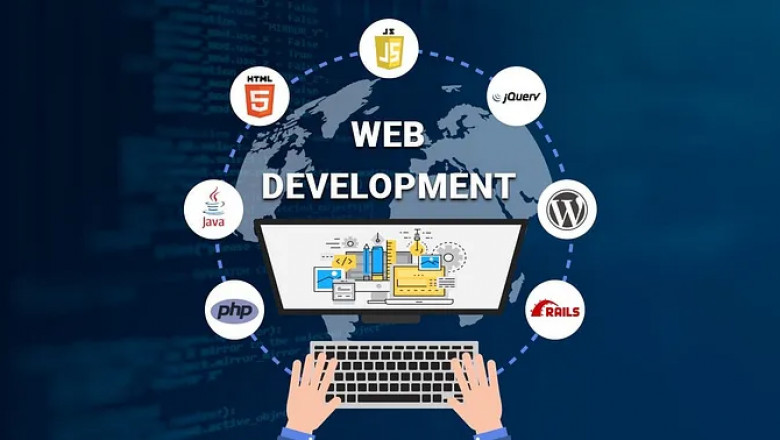views
Ultimate Guide to Web Development for Beginners
Alright, so you’re probably thinking of jumping into web development but not sure where to start, right? It’s okay, we’ve all been there. It can seem like a lot at first — all the languages, tools, and weird tech terms. But if you’re serious (or even just curious), this guide will help you get going without feeling too lost.
It’s not as hard as people make it sound. But yeah, it’s not easy either.
What is Web Development?
Let’s keep it simple. Web development is just building websites. That’s it.
You know when you open a page, click a button, fill a form, or scroll through an online shop? Someone built all that. And that’s what web developers do — they build the stuff you see (and the stuff you don’t).
There’s two parts mainly:
-
Frontend: This is the visible part — text, images, buttons, colors.
-
Backend: This handles data and logic — things like user login, saving info, handling accounts, etc.
You can focus on just one, or learn both. A lot of people start with frontend cause it’s more visual and easier to understand at first.
Where Should Beginners Start?
Start with the basics. And by basics, I mean:
-
HTML – builds the structure of a page.
-
CSS – makes it look better, like colors, layout, etc.
-
JavaScript – adds interactivity. Things like clicking a button or showing a popup.
You really don’t need to learn all three at once. Try starting with HTML for a few days. Make a simple webpage. Then slowly mix in CSS and JavaScript. Don’t rush it — slow progress is better than getting overwhelmed.
Do You Need Fancy Tools?
Nah. You don’t need a full setup with ten apps open. In fact, all you need to start is:
-
A code editor (like VS Code — it’s free and really popular).
-
A web browser (Chrome or Firefox work fine).
That’s it. Later, you’ll hear about things like Git, frameworks, and APIs. But ignore that for now. Just focus on writing some code and seeing what happens.
Build First, Worry About Perfection Later
Here’s what a lot of beginners mess up — they try to learn everything before building something. But honestly, the real learning happens when you build stuff.
Even if your website is ugly, broken, or missing features — it’s fine. You’ll learn a lot just from trying. Create a personal homepage. Or copy a site layout you like. Doesn’t matter what it is, just start something.
Mistakes are good. That’s how you figure things out.
Should You Learn Backend Too?
Eventually, yeah. But not right away.
Once you’re comfy with frontend (like you can build a working page without copying code), then backend starts making more sense. With backend, you can:
-
Save user info
-
Handle forms
-
Work with databases
-
Build login/logout systems
A lot of beginners start with Node.js because it uses JavaScript (which you’re already learning). But you can also try Python or PHP — whatever feels easiest for you.
Design Is Important (Even for Developers)
Even if you're not planning to be a designer, knowing a bit about design helps a lot. People care about how things look, even if they say they don’t.
Spacing, fonts, alignment, colors — this stuff matters. A clean layout is 10x better than something that’s just crammed together.
If you ever work with a web design company, you’ll see how much time they spend making sure everything “feels right” on a site. You don’t need to go deep into it, just learn enough to not make things look messy.
Learn From Good (and Free) Resources
Don’t go buying expensive courses on day one. There’s tons of free stuff that’s actually better than most paid stuff.
Here’s a few you can trust:
-
freeCodeCamp – easy lessons with real coding practice
-
MDN Web Docs – more detailed, good for looking things up
-
YouTube – just search what you’re trying to build and follow along
Try not to just watch. Pause, type along, break things, fix them. It’s how you learn.
Expect Bugs, Errors, and Headaches
You're gonna mess up. That’s just the deal. Your code won’t work. Or it’ll look weird. Or you’ll fix one thing and break two more.
But honestly, every developer goes through it. Even experienced ones. The only real difference is, they’ve learned to Google better and not panic.
Don’t let errors stop you. Treat them like puzzles — annoying, but fixable.
Real Experience > Endless Tutorials
Once you feel a bit comfortable, try doing something real. Maybe offer to build a site for a friend. Or make a small page for a local shop. Doesn’t have to be perfect.
If you get the chance to work with a web development company, even for free, that’s gold. You’ll learn how projects actually work, how teams communicate, and how to code with deadlines.
You’ll learn a lot more by doing than by reading about it.
A Few Last Tips for the Road
-
Don’t compare yourself to others. Everyone learns at a different pace.
-
Practice a little bit every day. Even 30 mins helps.
-
Don’t be afraid to ask dumb questions. There’s no such thing.
Web development is one of those things where you never fully stop learning. But that’s what makes it exciting. You’ll always find something new to build or explore.
Final Thought
At the start, everything looks hard. But little by little, it clicks. One day you’ll build a site and realize, "Wow, I actually did that."
Stick with it. Don’t let frustration stop you. And remember — every developer you look up to was once a beginner too.














Comments
0 comment